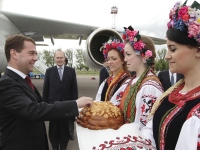Registration
You will receive an email confirming your registration.
IMGXYZ2523IMGZYXFor the moment, pragmatism has gained the upper hand over idealism and emotions in Russian-Ukrainian relations. As long as the two countries are willing to work together, they both have a good chance of achieving their core interests.
In a videoconference organized by the Carnegie Moscow Center and the Institute of World Policy in Kiev, coinciding with Russian President Dmitry Medvedev’s visit to Ukraine, Russian and Ukrainian experts discussed the changes in bilateral relations since Viktor Yanukovych was elected Ukrainian president. Carnegie’s Dmitri Trenin and Andrey Melville, professor at the Department of Applied Political Science at the Higher School of Economics, offered a Russian perspective on the relationship.
The experts on the Ukrainian side included Eduard Afonin, professor at the National Academy of Public Administration, Bogdan Sokolovsky, energy security adviser to former Ukrainian President Viktor Yushchenko, Alexander Litvinenko, expert on security issues, Mikhail Gonchar, director for energy programs at Nomos Center (Sevastopol), Pavel Zhovnirenko of the Center for Strategic Studies, Viktor Zamyatin, expert on Ukrainian foreign policy, and Igor Zhovkva of the International Centre for Policy Studies. Alyona Getmanchuk, director of the Institute of World Policy, moderated.
The panelists discussed a number of issues affecting Russian-Ukrainian relations, including:
- Ukraine’s independence. The Russian people, including the political class, have accepted the fact that Ukraine is an independent country. With that acceptance comes the understanding that the new Ukrainian president, Viktor Yanukovych, is not a pro-Russian politician, but rather a pro-Ukrainian one, who at the same time has undertaken to reconsider Ukraine’s relations with Russia in the spirit of being a good neighbor and for the mutual benefit of both sides.
- Modernization. The Russian and Ukrainian economies are both in need of modernization. Both countries face similar problems in raising much needed foreign investment. The panelists underscored that the two countries could avoid unnecessary competition, particularly in the military-industrial sphere, and should combine their potentials, for example, in the energy sector, where Russia and Ukraine have common interests in providing gas supplies to Europe.
- Ukrainian accession to NATO. The question of whether or not Ukraine should join NATO must be decided by Ukrainian citizens. Trenin said that if the issue of NATO accession is forced without first reaching a public consensus, the result could be serious social and political destabilization. Moreover, the question of NATO membership essentially reflects whether or not Ukrainian society views Russia as a potential threat.
- Mutual influence. The panelists agreed that the two nations can have positive influences on one another. Russia can have an impact on Ukraine by acting as an investor in the Ukrainian economy. At the same time, strengthening the foundations of Ukrainian democracy could have a positive effect on political evolution in Russia.
There is a growing public demand in both countries for building better relations. As Trenin noted, the two countries have the potential to be at least good neighbors, but their governments have yet to make use of all the available opportunities for improving bilateral relations.
